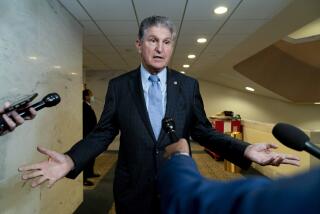President Dubs Himself ‘The People’s Lobbyist’
- Share via
WASHINGTON — President Reagan, appointing himself “the people’s lobbyist,” continued his assault Saturday against the “special interests . . . trying to pick apart” his tax reform plan.
Without naming names, Reagan said lobbyists and members of Congress supported by eager staff members with the right connections are opposing his plan to collapse the 14 or 15 income tax brackets into three and to lower most individual and corporate taxes at the expense of some popular family and business deductions.
It was Reagan’s 10th speech in nine days on tax reform and the second in as many days denouncing Washington insiders. Reagan made the speech from his Camp David, Md., mountain retreat.
“Washington doesn’t take to change very well,” he said. “That’s where the President comes in. The whole idea of the presidency is having somebody in the Oval Office who can try to get above the bickering and buttonholing in the cloakrooms and corridors and say: ‘Enough of this. Let’s just get something done for a change that will help the people.’ ”
The President said the current tax code is the best example of the kind of “confusing laws and chaotic regulations” that result from lobbying groups’ seeking special treatment.
“And the ones that have to try and make sense of all the rules and regulations, not to mention footing the bill for the special privileges, are Americans like you who can’t afford to hire a lobbyist in Washington,” he said.
“In a way then, the President should be the people’s lobbyist, your lobbyist, in Washington.”
In the radio broadcast used by Democrats to respond to the President, House Speaker Thomas P. (Tip) O’Neill Jr. addressed a different subject, urging a change in U.S. foreign policy in Central America and South Africa.
What the Reagan Administration is doing in both areas “contradicts what America stands for,” the Massachusetts Democrat said in remarks taped Friday.
He called for negotiations with the Marxist government of Nicaragua and tough economic sanctions against the white minority government of South Africa.
More to Read
Get the L.A. Times Politics newsletter
Deeply reported insights into legislation, politics and policy from Sacramento, Washington and beyond. In your inbox twice per week.
You may occasionally receive promotional content from the Los Angeles Times.









